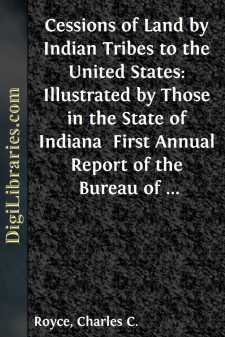Categories
- Antiques & Collectibles 13
- Architecture 36
- Art 48
- Bibles 22
- Biography & Autobiography 813
- Body, Mind & Spirit 142
- Business & Economics 28
- Children's Books 14
- Children's Fiction 11
- Computers 4
- Cooking 94
- Crafts & Hobbies 4
- Drama 346
- Education 46
- Family & Relationships 57
- Fiction 11829
- Games 19
- Gardening 17
- Health & Fitness 34
- History 1377
- House & Home 1
- Humor 147
- Juvenile Fiction 1873
- Juvenile Nonfiction 202
- Language Arts & Disciplines 88
- Law 16
- Literary Collections 686
- Literary Criticism 179
- Mathematics 13
- Medical 41
- Music 40
- Nature 179
- Non-Classifiable 1768
- Performing Arts 7
- Periodicals 1453
- Philosophy 64
- Photography 2
- Poetry 896
- Political Science 203
- Psychology 42
- Reference 154
- Religion 513
- Science 126
- Self-Help 84
- Social Science 81
- Sports & Recreation 34
- Study Aids 3
- Technology & Engineering 59
- Transportation 23
- Travel 463
- True Crime 29
Cessions of Land by Indian Tribes to the United States: Illustrated by Those in the State of Indiana First Annual Report of the Bureau of Ethnology to the Secretary of the Smithsonian Institution, 1879-80, Government Printing Office, Washington,...
by: Charles C. Royce
Categories:
Description:
Excerpt
CHARACTER OF THE INDIAN TITLE.
The social and political relations that have existed and still continue between the Government of the United States and the several Indian tribes occupying territory within its geographical limits are, in many respects, peculiar.
The unprecedentedly rapid increase and expansion of the white population of the country, bringing into action corresponding necessities for the acquisition and subjection of additional territory, have maintained a constant straggle between civilization and barbarism. Involved as a factor in this social conflict, was the legal title to the land occupied by Indians. The questions raised were whether in law or equity the Indians were vested with any stronger title than that of mere tenants at will, subject to be dispossessed at the pleasure or convenience of their more civilized white neighbors, and, if so, what was the nature and extent of such stronger title?
These questions have been discussed and adjudicated from time to time by the executive and judicial authorities of civilized nations ever since the discovery of America.
The discovery of this continent, with its supposed marvelous wealth of precious metals and commercial woods, gave fresh impetus to the ambition and cupidity of European monarchs.
Spain, France, Holland, and England each sought to rival the other in the magnitude and value of their discoveries. As the primary object of each of these European potentates was the same, and it was likely to lead to much conflict of jurisdiction, the necessity of some general rule became apparent, whereby their respective claims might be acknowledged and adjudicated without resort to the arbitrament of arms. Out of this necessity grew the rule which became a part of the recognized law of nations, and which gave the preference of title to the monarch whose vessels should be the first to discover, rather than to the one who should first enter upon the possession of new lands. The exclusion under this rule of all other claimants gave to the discovering nation the sole right of acquiring the soil from the natives and of planting settlements thereon. This was a right asserted by all the commercial nations of Europe, and fully recognized in their dealings with each other; and the assertion, of such a right necessarily carried with it a modified denial of the Indian title to the land discovered. It recognized in them nothing but a possessory title, involving a right of occupancy and enjoyment until such time as the European sovereign should purchase it from them. The ultimate fee was held to reside in such sovereign, whereby the natives were inhibited from alienating in any manner their right of possession to any but that sovereign or his subjects.
The recognition of these principles seems to have been complete, as is evidenced by the history of America from its discovery to the present day. France, England, Portugal, and Holland recognized them unqualifiedly, and even Catholic Spain did not predicate her title solely upon the grant of the Holy See....


